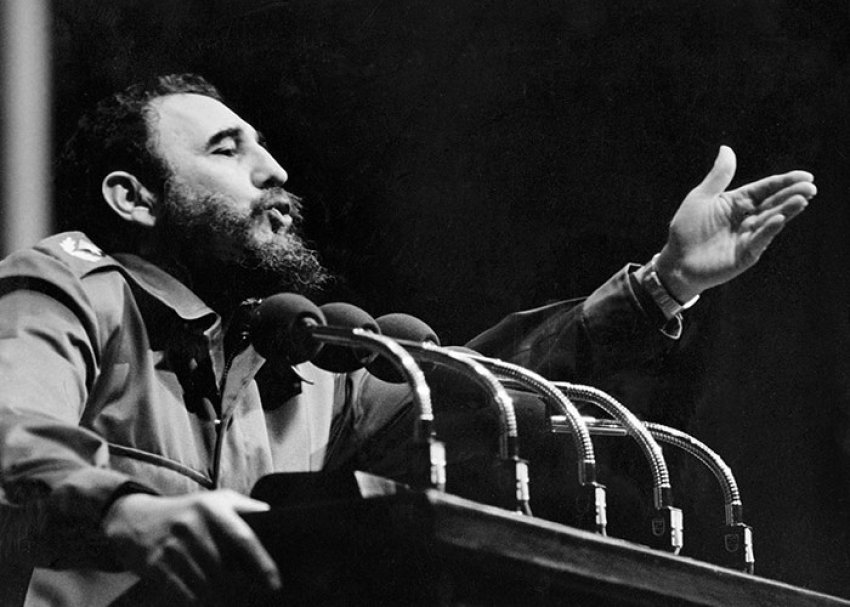
Fidel Castro, the historic leader of the Cuban Revolution, turned 90 on August 13. Progressive, anti-war and social justice forces across the world join in the celebration of the life of one of the world's most influential and significant leaders.
It is especially worthwhile and necessary to mark and valorise the life and times of a man whose heart, without missing a beat, has withstood more than 600 assassination attempts by US imperialism.
Fidel's life and legacy loom large in world history and development. Fidel is part and parcel of the wave of the anti-colonial, national liberation and social emancipation struggles that swept Africa, Asia, Latin America and the Caribbean in the second half of the 20th century.
Fidel is integral to the Cuban-born and international revolutionary and anti-imperialist tradition, theory and practice — stretching through the [indigenous Taíno Cacique (cheif)] Hatuey, Toussaint L'Overture, Simon Bolivar, Jose Marti, Karl Marx, Vladimir Lenin and Ho Chi Minh, among others.
Fidel does not transcend Cuba and history, as some have opined, but, instead, is ineluctably and organically bound to the deepest aspirations of the Cuban people and the demands of the times. Fidel belongs to the world. Flesh and blood, brain and bone, he exemplifies the finest traditions of humanity.
Video: Fidel Castro in his Words. TeleSUR English.
His life encapsulates the struggle of the exploited and oppressed, epitomising, as articulated by US political prisoner Mumia Abu Jamal, “their historic power to transform our dull realities”.
The significance of Fidel extends beyond the geographical boundaries of Cuba. Since its inception, the Cuban Revolution has made an invaluable contribution to the global struggle for justice, social development and human dignity.
Under Fidel's leadership, Cuba has established an unparalleled legacy of internationalism and humanitarianism, embodying the immortal words of [19th Century Cuban independence fighter] Jose Marti: “Homeland is Humanity. Humanity is Homeland.”
In southern Africa, for example, more than 2000 Cubans gave their lives to defeat the racist apartheid regime in South Africa. Nelson Mandela never forgot. After he was released from prison, one of the first countries outside of Africa and the first country in Latin America that he chose to visit was Cuba.
Today, this commitment to humanity is mirrored in the tens of thousands of Cuban medical personnel and educators who have served and continue to serve around the world. This service sees them battling in the trenches against disease and illiteracy, running the gamut from combating the Ebola outbreaks in west Africa to beating back other challenges to public health in southern Africa.
Video: Fidel Castro, A Living Legend. TeleSUR English.
No less important is the training inside Cuba of medical cadres from Asia, Africa, Latin America and the Caribbean as well as North America (including African-American communities from the largest US cities).
Fidel was only 26 when, on July 26, 1953, he led a group of courageous young men and women in the attack on the Moncada Barracks in the city of Santiago de Cuba, and the Carlos Manuel de Cespedes Barracks in Bayamo. It was an unsuccessful but valiant effort to overthrow the US-supported puppet dictator Fulgencio Batista. Moncada was a catalyst for the revolutionary struggle to free Cuba from US tutelage and establish authentic independence.
Fidel has epitomised the unbending commitment to justice, dignity and independence that has characterised Cuba since the triumph of the Cuban Revolution on January 1, 1959. He has led Cuban resistance against the unjust and genocidal economic, commercial and financial blockade imposed on the island by Washington.
No words can adequately convey the singular meaning of Fidel. By holding aloft the banners of Socialism, Justice, Peace, Internationalism and Human Dignity, the Cuban Revolution demonstrates that a better world is possible.
On October 16, 1953, at his trial following the Moncada attack, Fidel laid out his vision of national independence and social justice, declaring: “Condemn me, it does not matter, history will absolve me.”
Since those historic words and the subsequent unfolding of events, in a world fraught with intense challenges and dangers, history has not only absolved Fidel, but also vindicated the meaning and legacy of his life.
[Slightly abridged statement from the Canadian Network on Cuba.]